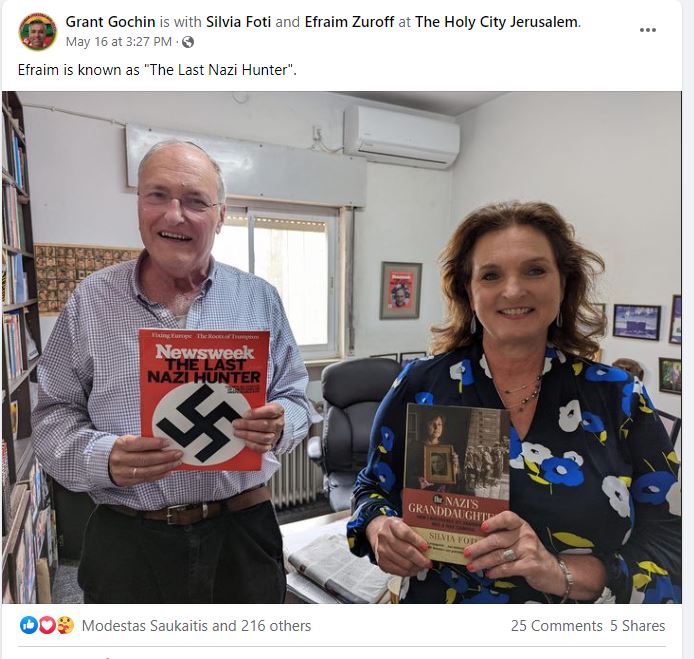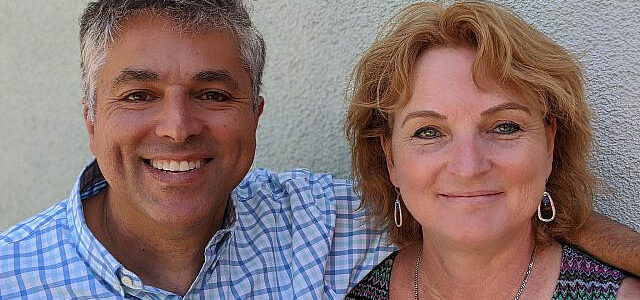by Efraim Zuroff, Times of Israel
photo: Grant Gochin and Silvia Foti, June, 2020.
What a shame that those who work to bring Lithuania’s large-scale participation in Holocaust crimes to light cannot be honored by the Jewish community there
This week the Lithuanian Jewish community is hosting the “Fifth World Litvak Congress” in Vilnius (Vilna) from Sunday, May 22 until Thursday, May 26. In theory, the event is open to any Jew of Lithuanian origin and anyone who has a meaningful connection to the history, politics or culture of Lithuanian Jewry.
The program features an opening event in the Lithuanian Seimas (Parliament), cultural events, as well as visits to Kaunas (Kovno), Panevezys (Ponevitch), Seduva (my grandmother’s birthplace), and other sites of Jewish interest. The congress will also be addressed by Lithuanian politicians, such as Seimas Speaker Viktorija Čmilyté-Nielsen, the patron of the congress, foreign experts on combatting anti-Semitism, such as European Commissioner Katharina Von Schnurbein and former Canadian Justice Minister Irwin Cotler, as well as scholars who are experts on aspects of Lithuanian Jewish history, such as American Professor David Fishman and Israeli Dr. Ben-Tsiyon Klibansky.
The program even includes presentations which might address the ostensibly most controversial subjects regarding Jewish history in Lithuania, those dealing with the role of Lithuanians in the Holocaust. Thus, for example, Faina Kukliansky, the chairperson of the local Jewish community for close to a decade, was allotted all of 15 minutes for the important topic of “Thirty Years of History, Problems and Challenges of the Lithuanian Jewish Community,” and Lithuanian professor Violeta Davoliūte of Vilna University was given a whole quarter of an hour to speak about “Memory of the Shoah.”
This week the Lithuanian Jewish community is hosting the “Fifth World Litvak Congress” in Vilnius (Vilna) from Sunday, May 22 until Thursday, May 26. In theory, the event is open to any Jew of Lithuanian origin and anyone who has a meaningful connection to the history, politics or culture of Lithuanian Jewry.
The program features an opening event in the Lithuanian Seimas (Parliament), cultural events, as well as visits to Kaunas (Kovno), Panevezys (Ponevitch), Seduva (my grandmother’s birthplace), and other sites of Jewish interest. The congress will also be addressed by Lithuanian politicians, such as Seimas Speaker Viktorija Čmilyté-Nielsen, the patron of the congress, foreign experts on combatting anti-Semitism, such as European Commissioner Katharina Von Schnurbein and former Canadian Justice Minister Irwin Cotler, as well as scholars who are experts on aspects of Lithuanian Jewish history, such as American Professor David Fishman and Israeli Dr. Ben-Tsiyon Klibansky.
The program even includes presentations which might address the ostensibly most controversial subjects regarding Jewish history in Lithuania, those dealing with the role of Lithuanians in the Holocaust. Thus, for example, Faina Kukliansky, the chairperson of the local Jewish community for close to a decade, was allotted all of 15 minutes for the important topic of “Thirty Years of History, Problems and Challenges of the Lithuanian Jewish Community,” and Lithuanian professor Violeta Davoliūte of Vilna University was given a whole quarter of an hour to speak about “Memory of the Shoah.”
In other words, the congress has no intention of exposing, let alone attempting to deal with the dangerous problem of Lithuanian Holocaust distortion which has plagued the country since it regained its independence from the Soviet Union in March, 1990. Given the fact that the local Jewish community numbers less than 5,000 members, and suffers from internal dissent, one cannot blame them for staging an event which is a festival of celebration of a community doomed to extinction, highlighting the renovation of synagogues in communities without a single Jew which will never again fulfill their original purpose.
Ironically, a different event sponsored by the Igud Yotzei Lita (Association of Lithuanian Jews in Israel) was held in Tel Aviv last week, attracting a large crowd of Litvaks, anxious to combat the false narrative promoted for the last three decades by the Lithuanian government, which minimizes the extremely significant role of local collaborators, and glorifies Holocaust perpetrators who led the post-World War II fight against the Soviet occupation.
This week, the Lithuanian Jewish community is hosting the “Fifth World Litvak Congress” in Vilnius (Vilna) from Sunday, May 22 until Thursday, May 26. In theory, the event is open to any Jew of Lithuanian origin and anyone who has a meaningful connection to the history, politics, or culture of Lithuanian Jewry.
The program features an opening event in the Lithuanian Seimas (Parliament), cultural events, as well as visits to Kaunas (Kovno), Panevezys (Ponevitch), Seduva (my grandmother’s birthplace), and other sites of Jewish interest. The congress will also be addressed by Lithuanian politicians, such as Seimas Speaker Viktorija Čmilyté-Nielsen, the patron of the congress, foreign experts on combatting anti-Semitism, such as European Commissioner Katharina Von Schnurbein and former Canadian Justice Minister Irwin Cotler, as well as scholars who are experts on aspects of Lithuanian Jewish history, such as American Professor David Fishman and Israeli Dr. Ben-Tsiyon Klibansky.
The program even includes presentations which might address the ostensibly most controversial subjects regarding Jewish history in Lithuania, those dealing with the role of Lithuanians in the Holocaust. Thus, for example, Faina Kukliansky, the chairperson of the local Jewish community for close to a decade, was allotted all of 15 minutes for the important topic of “Thirty Years of History, Problems and Challenges of the Lithuanian Jewish Community,” and Lithuanian professor Violeta Davoliūte of Vilna University was given a whole quarter of an hour to speak about “Memory of the Shoah.”
In other words, the congress has no intention of exposing, let alone attempting to deal, with the dangerous problem of Lithuanian Holocaust distortion, which has plagued the country since it regained its independence from the Soviet Union in March 1990. Given the fact that the local Jewish community numbers less than 5,000 members, and suffers from internal dissension, one cannot blame them for staging an event, which is a festival of celebration of a community doomed to extinction, highlighting the renovation of synagogues in communities without a single Jew, which will never again fulfill their original purpose.
Ironically, a different event sponsored by the Igud Yotzei Lita (Association of Lithuanian Jews in Israel) was held in Tel Aviv last week, attracting a large crowd of Litvaks, anxious to combat the false narrative promoted for the last three decades by the Lithuanian government, which minimizes the extremely significant role of local collaborators, and glorifies Holocaust perpetrators who led the post-World War II fight against the Soviet occupation.
The guests of honor were two descendants of Lithuanian citizens, both currently residing in the United States, who were not invited to attend, let alone present, at the current Litvak World Congress, and not by accident. Both are determined to do whatever they can to persuade the Lithuanian authorities to honestly confront the large-scale participation of Lithuanians in Holocaust crimes, and thereby have earned the disdain of Lithuanian officials, which naturally affects the attitude of the local Jewish community.
The star of the event was Silvia Foti, the granddaughter of one of the biggest Lithuanian national heroes, Jonas Noreika, who was a leader of the post-World War II opposition to the Soviets, but played a key role in Holocaust crimes as the local liaison with the Nazis in northwest Lithuania. Her story is truly amazing.
Raised in Marquette Park, Chicago, the largest concentration of Lithuanians outside Vilnius, Silvia imbibed the deep adulation of her grandfather by her Lithuanian émigré neighbors, and grew up in an ultra-patriotic Lithuanian family. At the deathbed request of her mother, who had originally undertaken to write her father’s biography, Silvia began to research her grandfather’s life, only to discover his key role, in the mass murder of thousands of Jews. Instead of abandoning the project, Silvia was determined to fully clarify his past, and ultimately realized that her beloved ancestor was indeed a Nazi war criminal. The result was her illuminating book “The Nazi’s Granddaughter: How I Discovered That My Grandfather Was a War Criminal.”
The second guest of honor was Grant Gochin, a Litvak born in South Africa, currently residing in Los Angeles, who lost practically his entire family in the area where Noreika collaborated with the Nazis. Ever since he discovered Noreika’s role in the murders, he has waged a legal battle against the Lithuanian government to force them to cancel the numerous honors bestowed upon the man. He has submitted such suits to Lithuanian and international courts, and a current suit is under consideration at the United Nations. When Silvia found the initial evidence regarding her grandfather’s crimes, she reached out to Grant, who has devoted much effort to assisting her with the publication and promotion of her book, which has attracted worldwide attention and been published in several languages, including quite recently in Lithuanian.
Both Silvia and Grant were given the standing ovation they well deserved by a very appreciative audience of Litvaks, who are sick of the lies and false narrative of the Holocaust promoted by the Lithuanian government. They are part of a group of truth-tellers in Lithuania, determined to fight for the accurate account of the tragedy of Lithuanian Jewry, such as Dovid Katz, and Pinchos Friedberg, and ethnic Lithuanians such as Rūta Vanagaitė (who was the first to deal with issue after discovering that her family were participants in Holocaust crimes) and researcher Evaldas Balčiūnas. None of them was invited to the Litvak Congress, but their efforts will ultimately count more than any of the speeches delivered in Vilnius this week.
Full editorial here.



